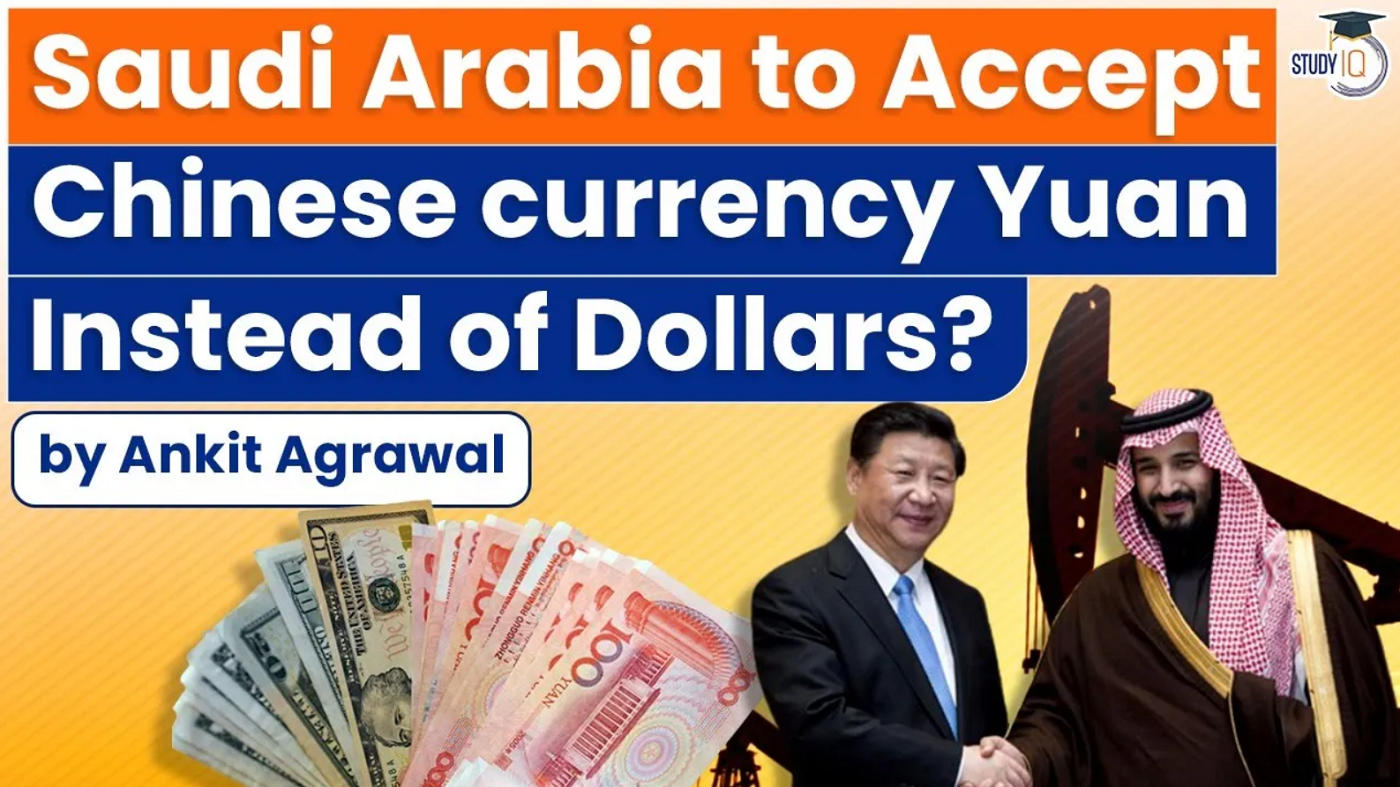Table of Contents

What’s happening?
- Saudi Arabia is in active talks with Beijing to price its some of its oil sales to China in yuan, people familiar with the matter said, A move that would dent the U.S. dollar’s dominance of the global petroleum market and mark another shift by the world’s top crude exporter toward Asia.
- The talks with China over yuan-priced oil contracts have been off and on for six years,
- But have accelerated this year as the Saudis have grown increasingly unhappy with decades-old U.S. security commitments to defend the kingdom, the people said.
significance
- China buys more than 25% of the oil that Saudi Arabia exports. If priced in yuan, those sales would boost the standing of China’s currency.
- It would be a profound shift for Saudi Arabia to price even some of its roughly 6.2 million barrels of day of crude exports in anything other than dollars.
- The majority of global oil sales—around 80%—are done in dollars, and the Saudis have traded oil exclusively in dollars since 1974, in a deal with the Nixon administration that included security guarantees for the kingdom
Efforts to strengthen Yuan
- China introduced yuan-priced oil contracts in 2018 as part of its efforts to make its currency tradable across the world, but they haven’t made a dent in the dollar’s dominance of the oil market.
- For China, using dollars has become a hazard highlighted by U.S. sanctions on Iran over its nuclear program and on Russia in response to the Ukraine invasion.
- China has stepped up its courtship of the Saudi kingdom.
- In recent years, China has helped Saudi Arabia build its own ballistic missiles,
- Consulted on a nuclear program and begun investing in Crown Prince Mohammed bin Salman’s pet projects, such as Neom, a futuristic new city.
But why this shift towards China?
- The U.S. economic relationship with the Saudis is diminishing.
- The U.S. is now among the top oil producers in the world.
- It once imported 2 million barrels of Saudi crude a day in the early 1990s but those numbers have fallen to less than 500,000 barrels a day in December 2021.
- By contrast, China’s oil imports have swelled over the last three decades, in line with its expanding economy.
- Saudi Arabia was China’s top crude supplier in 2021, selling at 1.76 million barrels a day, followed by Russia at 1.6 million barrels a day, according to data from China’s General Administration of Customs.
- “The dynamics have dramatically changed. The U.S. relationship with the Saudis has changed, China is the world’s biggest crude importer and they are offering many lucrative incentives to the kingdom,” Said a Saudi official familiar with the talks.
- “China has been offering everything you could possibly imagine to the kingdom,” the official said.
US Saudi relations
- Relations between the US and Saudi Arabia have chilled during the Biden administration over American policy in the Gulf region.
- Issues include the revival of the Iran nuclear deal; lack of US support for Saudi intervention in Yemen’s civil war and its refusal to add Houthis to its list of terrorist groups;
- US help with a Saudi civilian nuclear program; and legal immunity for Prince Mohammed, who is facing lawsuits over the murder of Saudi journalist Jamal Khashoggi by a Saudi hit-team in its Istanbul consulate four years ago.

- During Biden’s election campaign he vowed to treat the kingdom as a “pariah” state, saying there is “very little social redeeming value in the present government in Saudi Arabia.”
- Saudi officials have said they were shocked by the precipitous U.S. withdrawal from Afghanistan last year.
But it’s not that easy
- A senior U.S. official called the idea of the Saudis selling oil to China in yuan “highly volatile and aggressive” and “not very likely.“
- The official said the Saudis had floated the idea in the past when there was tension between Washington and Riyadh.
- It is possible the Saudis could back off.
- Switching millions of barrels of oil trades from dollars to yuan every day could rattle the Saudi economy, which has a currency, the riyal, pegged to the dollar.
- Prince Mohammed’s aides have been warning him of unpredictable economic damage if he moves ahead with the plan hastily.
- Doing more sales in yuan would more closely connect Saudi Arabia to China’s currency, which hasn’t caught on with international investors because of the tight controls Beijing keeps on it.
- Contracting oil sales in a less stable currency could also undermine the Saudi government’s fiscal outlook.
Q) Which among the following are Saudi Arabia’s natural resources?
- Petroleum, natural gas, iron ore, and gold
- Natural gas, iron ore, gold, and diamonds
- Iron ore, gold, diamonds, and copper
- Gold, natural gas, copper, and diamonds
























 WhatsApp
WhatsApp